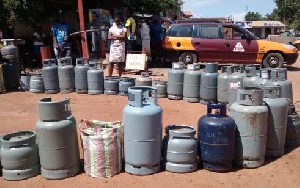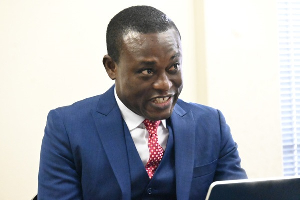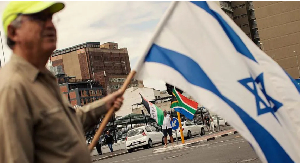Let me say this from the onset.
I have a business interest in the LPG distribution and retailing business, and so I am not an impartial commentator on the government policy of Cylinder Recirculation Model (CRM).
What is CRM?
On 7th October 2017 there was a gas explosion at an LPG station at the Madina Atomic Junction in Accra that led to the loss of lives, injuries and loss of valuable property. At a Cabinet meeting of 12th October 2017, the President of the Republic, on the advice of Cabinet, directed that henceforth the Cylinder Recirculation Model of Liquefied Petroleum Gas (LPG) distribution should be implemented.
The statement issued by the Minister of Information announcing the Presidential directive said “in the past three years, we have been subjected to eight such incidents of explosions. This latest incident was one too many, which we must take all necessary steps to bring it to an end”.
If further stated that “the model means that LPG Bottling Plants will be sited away from congested commercial and population centers and will procure, brand, maintain and fill empty cylinders to be distributed to consumers and households through retail outlets. Low risk stations will be designated for the supply of gas to vehicles. This whole exercise must be completed within one year”.
The directive also outlined nine interim measures to assure the safety of citizens.
Since then government officials have in public interviews added LPG penetration as an additional justification for CRM.
Let us examine the issues.
CRM, as it stands now, is not an answer to safety
Between 2014 and 2017 there were three (3) major LPG explosions in Ghana that happened at LPG stations.
23rd December 2016 – La, Trade Fair
9th May 2017 – Takoradi
12th October 2017 – Madina Atomic Junction
The common thread in these three incidents was that the explosions happened when a gas tanker was at the station discharging LPG.
There have been five (5) other major LPG explosions that have occurred outside LPG stations including the incident on 18th August 2017 at Delta Agro, a manufacturer of soaps at the Tema Industrial Area, and the 26th September 2017 one at Tulip Inn Hotel at Shiashie, Accra.
Notwithstanding a public call by the LPG Marketing Companies Association of Ghana in December 2017, the NPA has not deemed it fit to share the Fire Incident Report (with the findings, conclusions and recommendations) on the Madina Atomic Junction incident with LPG marketers and operators.
The report is a secret and confidential document. I will revisit the absurdity of this absence of transparency and full disclosure on a public interest matter by a regulatory body like the NPA another day especially when the government has committed itself to passing a Right to Information (RTI) law.
My questions to the Ministry of Energy and NPA is this:
For the stations that will be designated as low risk for the supply of LPG to vehicles, how will they receive their LPG supplies?
Is it not gas tankers that will deliver LPG from Tema and Atuabo to these LPG stations and other bulk consumers like Accra Mall, secondary schools and hospitals.
How does CRM respond to the LPG explosions that have occurred outside LPG stations?
Thankfully, we have not had a gas tanker explosion on our highways in recent years. But how does CRM address this risk as well?
And who told the Ministry of Energy and NPA that ferrying filled gas cylinders on trucks on highways is without risk.
They should check out these videos on youtube.
https://www.youtube.com/watch?v=i5hvRcwOjsU,
https://www.youtube.com/watch?v=lBqZZ177Q9I
https://www.youtube.com/watch?v=GpAoYBWVbvs
CRM, as it stands now, will not improve penetration
The NPA’s own statistics downloaded from its website indicates that LPG consumption increased from 43,503 metric tonnes in 1999 to 276,702 metric tonnes in 2017. This represents an increase of 536% over 19 years.
Between 2010 and 2016 national consumption increased by 78%. The regional data shows that the regions with the greatest increases were Upper West (430%), Upper East (370%), Northern (229%), Eastern (216%) and Central (171%). Ashanti region recorded the least growth of 39%.
LPG use is penetrating all corners of Ghana without CRM. Any casual observer driving through the countryside will see LPG stations springing up in urban and rural areas of Ghana.
This growth has been driven by Ghanaian entrepreneurs in the form of LPG marketing companies and LPG station operators.
There is definitely room to increase the LPG penetration rate. However the government’s CRM is not the answer more so when the policy seeks to replace, rather than complement, the existing distribution channel to the LPG household market.
A CRM policy that seeks to increase LPG penetration, and that makes sense, is one that offers an additional distribution channel to household consumers, not one that that collapses the existing distribution channel of cylinder refilling at LPG stations.
CRM, as it stands now, will cause enormous harm to LPG Operators and Society
The October 2017 Presidential directive included “the immediate cessation, until further notice, of all construction of facilities intended for use as gas or petroleum retail stations”. The ban on petroleum was lifted some months ago. That for LPG remains in force at great financial loss to operators.
The minimum cost to construct an LPG station is in the region of GHS400,000. Before construction begins, you require permits from the Environmental Protection Agency (EPA), District Assembly, Fire Service and National Petroleum Petroleum Authority. Note that the time the entrepreneur spends running around to build the station is not part of the financial estimate.
After construction, these agencies have to visit the station and inspect facilities before the NPA finally issues an operating permit to begin operations.
Prior to October 2017 there were new LPG stations with all the required permits under construction. Some of these stations have been completed now, and fully inspected by the relevant agencies including the NPA.
However, the NPA has declined to give operating permits.
The owners of these fully completed stations that cannot operate are counting their financial losses in lost sales and mounting interest charges on bank loans. Some could potentially lose property they have used to secure bank loans for these projects.
These new LPG stations are sited in under-served LPG markets in Ghana. The residents of these areas have been denied the opportunity to buy LPG gas. The jobless youth in these areas have also been denied jobs as station attendants, security personnel and cashiers.
CRM will also throw out a lot of tanker owners out of business with major job and financial losses.
Hidden Foreign Interests
The disgusting part of this entire saga is the role of the New York based Global LPG Partnership (GLPGP) http://glpgp.org/
GLPGP claims to be a United Nations (UN)-backed Public-Private Partnership formed in 2012, under the UN Sustainable Energy for All initiative, to aggregate and deploy needed global resources to help developing countries transition large populations rapidly and sustainably to liquefied petroleum gas (LPG) for cooking.
It has engagements with governments of eight African countries – Cameroon, Ghana, Kenya, Nigeria, Rwanda, South Africa, Tanzania and Uganda – in planning, policy and regulatory reforms, and investments.
It has identified and defined approximately US$1 billion of potential LPG scale-up investments in three first-mover African countries, and around US$1 billion in other priority countries to date.
GLPGP has had interest in Ghana since 2011, or perhaps before. Their relationship with the NPA predates this government.
When government announced the CRM policy in October 2017, GLPGP quickly appointed a resident Country Manager in Ghana, supposedly at the request of the NPA, to assist the NPA implement CRM.
In a March 2018 release, GLPGP cites Ghana, Cameroon and Kenya as part of their current scope of activities where “new national LPG policies, laws and regulations have been completed and submitted for cabinet or parliamentary approval. These governments’ goals are to increase LPG use to 50-60% of their populations from 10-15% today”.
GLPGP’s involvement in Kenya and Cameroun has not led to any significant improvement in LPG penetration.
Behind the scenes, GLPGP has been lobbying government officials and some LPG marketers for CRM to be deployed (to cripple existing operators) to provide the competitive space for investing by their business partners and associates.
Sadly our politicians and government officials whose salaries, perks and expensive Toyota Landcruiser V8 vehicles are paid by our taxes, and who are supposed to work for us, Ghanaians, seem to be promoting the interest of GLPGP and their acolytes.
Ghana Beyond Aid indeed.
CRM, in some form, is already happening in Ghana
The business of marketing and retailing LPG is a low margin one with profitability driven by sales volume.
Until the NPA’s operating ban in October 2017, new LPG stations were springing up in various parts of the country on a monthly basis. Competition amongst marketers and operators is fierce. And with rising operating costs, everyone in the business is constantly looking for ways to increase sales volumes.
Almost every marketer and operator does door to door delivery of LPG to large users like industries, hotels, restaurants and schools.
Some LPG marketers and station operators have invested in trucks, pickups and tricycles, to extend their distribution reach from their stations to the doorstep of their customers.
So why the rush by the Ministry of Energy and NPA to kill the entrepreneurial zeal and innovation by indigenous operators in the LPG business with their CRM policy?
Is it that the Ministry of Energy and NPA does not understand the LPG sector they are mandated to oversee and regulate, and the evolving trends in the business?
The Government’s Policy Making Process Was Flawed
The Atomic explosion of October 2017, like others before it, led to a public outcry.
However the Akuffo Addo administration must understand that public policy making is not conducted by sentiment. It is a fact and evidence based logical process with stakeholder engagement at the core of it.
What analysis and stakeholder consultation did the NPA and Ministry of Energy do before recommending CRM to the President and Cabinet in the 5 day period between the Atomic fire and the announcement of CRM policy?
The NPA and Ministry of Energy only began stakeholder consultations after the President’s directive. They had made up their minds, and were expecting LPG marketers and operators to fall in line.
They had forgotten that since January 7, 2017 Ghanaians have decided to be citizens, and not spectators.
Mr. President, we appreciate that you are in a hurry to deliver on the mandate conferred on you by your fellow Ghanaians. However hurrying policy making without proper analysis and stakeholder engagement will lead to failure.
Mr. President, I make the following plea.
1. Suspend the CRM policy and its implementation immediately.
2. Direct the NPA to lift the ban on issuing operating permits to newly completed LPG stations that have full filled all the regulatory requirements.
3. Direct the Ministry of Energy and NPA to publicly release all investigative reports on the LPG explosions that have occurred in the last 4 years.
4. Direct the Ministry of Energy and NPA to engage all stakeholders in the LPG value chain, in particular, LPG marketers, LPG station operators, LPG tanker drivers and driver mates, LPG facility installers and mechanics, etc to prepare or update standard operating procedures (SOP) to improve safety in the LPG sector.
The most critical SOP for safety is one for discharging LPG by gas tankers at LPG stations.
The question of improving LPG penetration requires extensive stakeholder consultation between government and the LPG private sector to formulate a policy and strategy.
Lastly our politicians and government officials when engaging with entities like GLPGC should remember the story of the Trojan horse in Greek mythology.
For God. And for Country.
Nicholas Issaka Gbana
nissakagbana@gmail.com
The writer is a Development Worker and Management Consultant (and Stakeholder in the LPG Sector)
Opinions of Tuesday, 29 May 2018
Columnist: Nicholas Issaka Gbana
The government’s LPG cylinder re-circulation model policy is misguided
Entertainment














